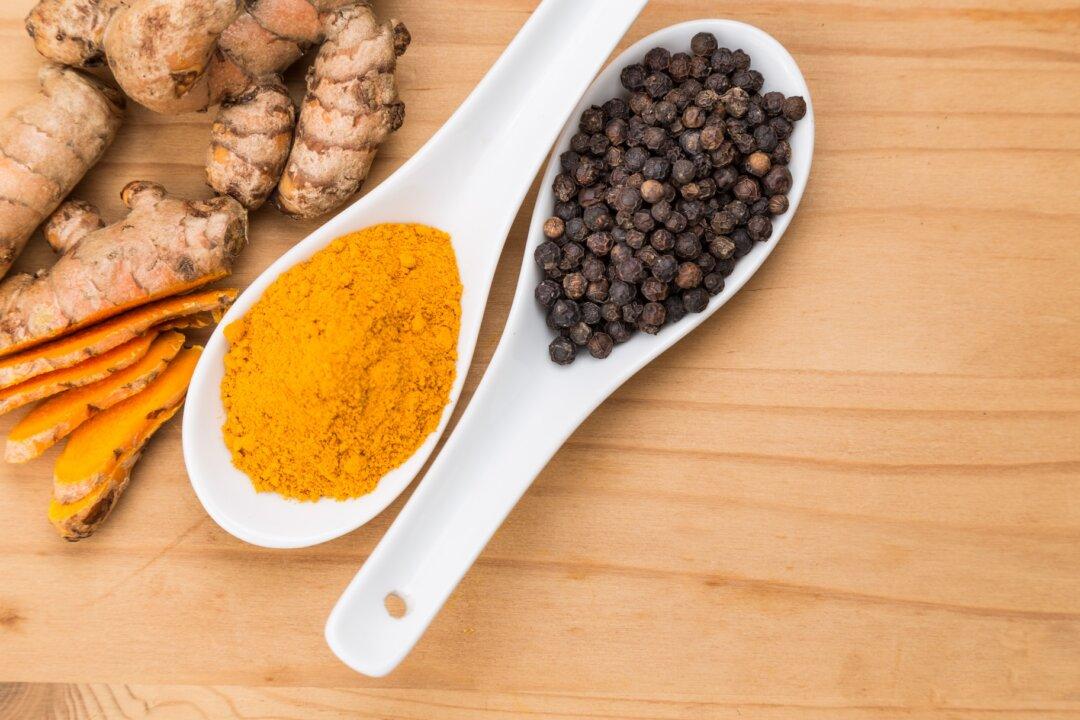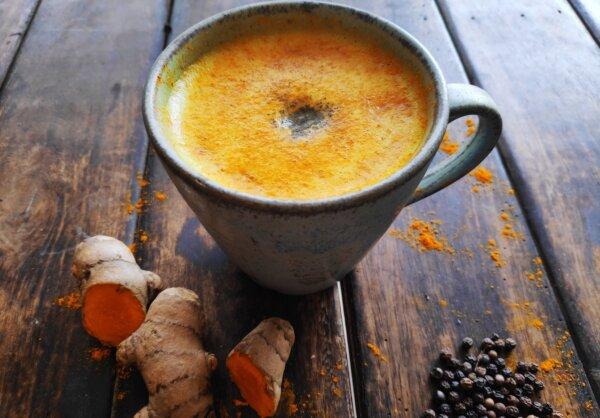- Nutrition
- Posts
- A Dynamic Duo–Turmeric and Black Pepper
A Dynamic Duo–Turmeric and Black Pepper
Curcumin, when taken alone, has poor bioavailability—however, when combined with the alkaloid helper piperine, it becomes a powerhouse for healing.

Turmeric root and black pepper combination enhances bioavailability of cucurmin absorption. (ThamKC/Shutterstock)
As a universal “remedy go-to,” turmeric is extremely popular. People talk about it, cook with it, or take supplements filled with the bright yellow powder. Although turmeric has proven to be safe even when ingested in high dosages (12 grams per day), it comes with a caveat that many might not be aware of.
The rhizome of this native Asian plant contains the polyphenolic compound curcumin, which has a seemingly endless list of beneficial properties. Unfortunately, turmeric displays poor bioavailability—meaning that its health-promoting components cannot get to their necessary destination easily because regular digestion breaks them down and eliminates them quickly.
Turmeric’s Bioavailability Problem
A review published in Molecular Pharmaceutics lists “rapid metabolism“ and ”rapid systemic elimination” as two causes, in addition to poor absorption, that might hinder turmeric reaching its full healing potential in our bodies.
A 2019 review highlights the same pharmacokinetic problems and adds that phase II metabolism in the liver, also called conjugation, severely reduces the oral bioavailability and speeds up the elimination process.
Don’t Throw Out the Baby With the Bathwater
Nonetheless, keep your turmeric stockpile in the pantry, as one of the previously mentioned reviews also indicates that even with a lower rate of absorption, curcumin is still a valuable spice with therapeutic efficacy “against various human diseases, including cancer, cardiovascular diseases, diabetes, arthritis, neurological diseases, and Crohn’s disease.”
Researchers have been exploring solutions and have found that the alkaloid piperine might do the trick. Piperine is what provides black pepper with its distinct bite and has healthy properties by itself.
Piperine to the Rescue
Piperine has anti-inflammatory properties that also work to improve fatty liver and reduce insulin resistance. It works against chronic diseases, according to a review in Advances in Experimental Medicine and Biology.
That’s not all. In a 2021 analysis in Phytotherapy Research, which considered several in-vitro and in-vivo trials, piperine displayed qualities that fight cancer, such as antitumor, antiproliferative, antiangiogenesis, and antioxidant potentials. The active compound of black pepper also exhibited “antidiabetic, anti-obesity, cardioprotective, antimicrobial, antiaging, and immunomodulatory effects.”
Black pepper is also said to be “hepatoprotective, anti-allergic, anti-inflammatory, and neuroprotective.”
The Dynamic Duo
The combination of turmeric root and black pepper creates a dynamic duo that counters accelerated elimination and enhances the absorption of turmeric’s medicinal qualities.
In a 2023 comprehensive review, all findings point to the beneficial effects of the curcumin-piperine twosome. People who suffer from diabetes, obesity, or metabolic syndrome can take advantage of the spices’ antioxidant qualities and those that will improve glycemic indices and lipid profiles.
The paper refers to the duo “reducing oxidative stress and depression in chronic stress and neurological disorders, also improving chronic respiratory diseases, asthma, and COVID-19.”
A clinical trial published in Planta Medica compared the absorption rate of curcumin properties in humans and animals. Researchers examined the contrasting assimilation of both sole curcumin and the curcumin-piperine duo.
In the rats, piperine increased the bioavailability of curcumin by as much as 154 percent. The assimilation increased even more significantly in humans, where the simultaneous administration of both active substances improved the benefits of turmeric by 2,000 percent—without any adverse effects.
Turmeric Supplements and Drug Interactions
With all of these health benefits, some must think “the more the better,” but that is not the case, according to Mary-Eve Brown, an oncology clinical dietitian and nutritionist at Johns Hopkins Medicine.
In an article about the dietary facts of turmeric and its drug interactions, she warned that “turmeric supplements can lessen the effects of [painkillers, such as] indomethacin, aspirin, ibuprofen, or acetaminophen” and “increase the risk of bleeding in people taking warfarin,” a blood thinner.
Ms. Brown also pointed out that individuals who take the immunosuppressant tacrolimus may experience side effects if ingesting high doses of turmeric and went into detail about what those could be.
She encouraged people to instead consume turmeric and black pepper in dietary form, meaning in soups, stews, and other foods and drinks, such as tea.
The likelihood of “overdosing” is much smaller that way, according to Ms. Brown.
If you do opt for a turmeric supplement, however, ensure that black pepper is added to complement the mix.
Practical Application in the Kitchen
Turmeric has numerous applications in the kitchen. By itself, the yellow spice has an earthy but mostly bland taste. It’s typically noted for its vigorous color that stains anything it comes into contact with.
Yet do not be afraid to use the turmeric-pepper duo generously in your cooking. You can add the spices to sautéed or grilled vegetables, use them in stews and soups, sprinkle them on salads or scrambled eggs, or use them to enhance the flavor of your smoothie.
Since turmeric is one of the main ingredients in curry powder, I like to add the spice mix and some black pepper to my rice water when cooking the grains. This not only gives the usually colorless and bland rice a wonderful hue but provides it with some Middle Eastern flavor and additional health benefits.
A Simple Recipe From My Kitchen
Especially for people who like chai lattes or other herbal spiced teas, the following recipe might be a new favorite. Even those who would usually order a syrup-laden flavored coffee may want to opt for this healthy version of a soothing and warm beverage.
Spiced Turmeric Latte With Black Pepper

Spiced turmeric latte made with turmeric, milk, honey or maple syrup, black pepper, and cinnamon. (Capturastock/Shutterstock)
Ingredients
1 cup any type of dairy or nut milk or 1/2 cup each of two different types of milk
2 teaspoons freshly grated turmeric root or 1 teaspoon dried turmeric powder (or 2 turmeric tea bags for a simpler method)
Freshly ground ginger root or dried ginger to taste, optional.
1/2 teaspoon honey or maple syrup
Cracked or freshly ground black pepper to taste
A dash of cinnamon
Instructions
Start with your choice of dairy or nut milk or your favorite combination. You get the most creamy result from using whole milk or light coconut milk, but you can also mix milks. (Try some variations to see what you enjoy most.)
Bring milk to a near-boiling temperature. If using freshly grated or dried turmeric and/or freshly grated or dried ginger, steep them together with the milk when heating it. Strain.
If using tea bags, pour milk over the tea bags and steep for about 4 minutes. Remove tea bags.
Add honey or maple syrup to taste. Top the finished beverage with cinnamon and ground pepper. Enjoy!